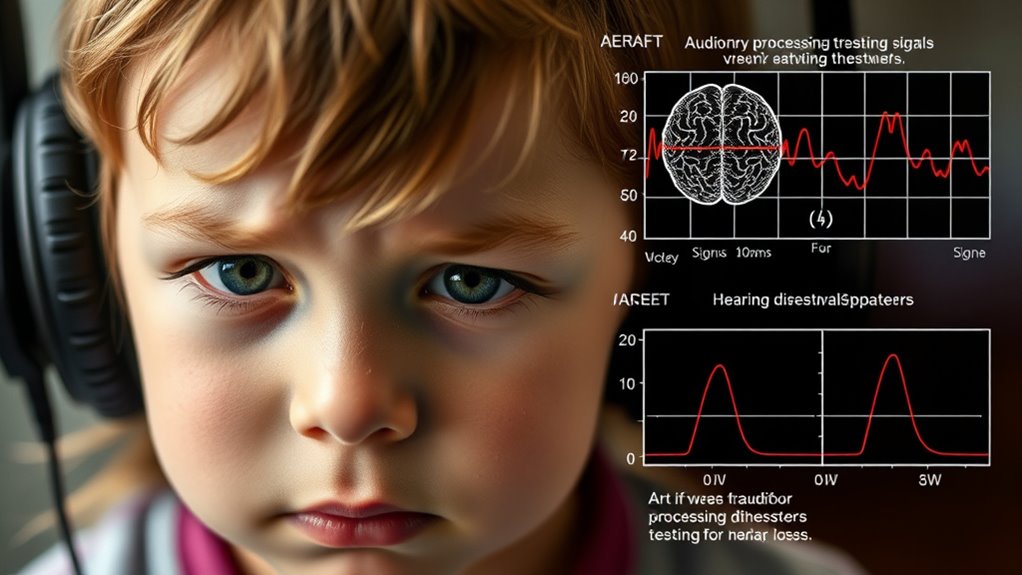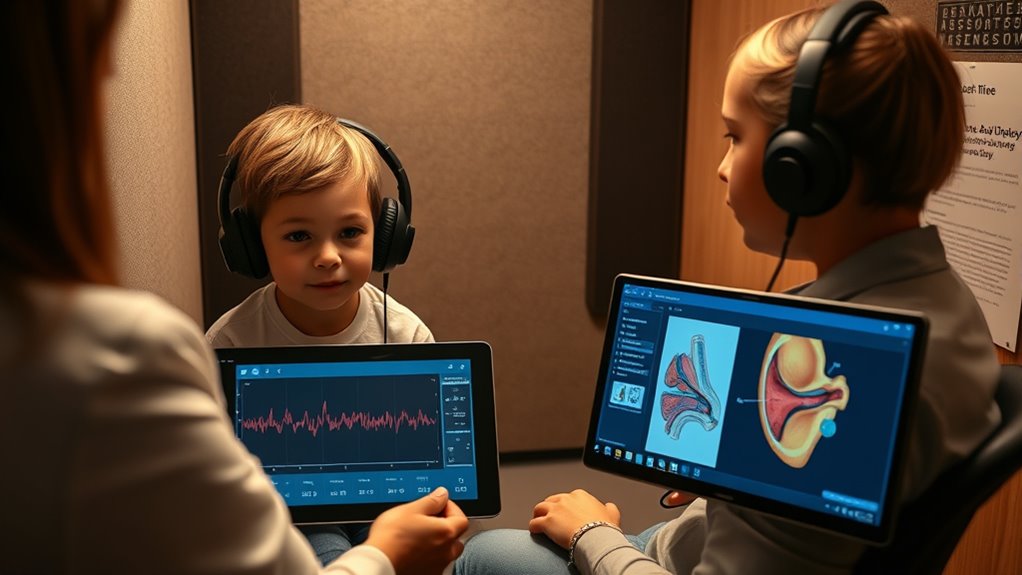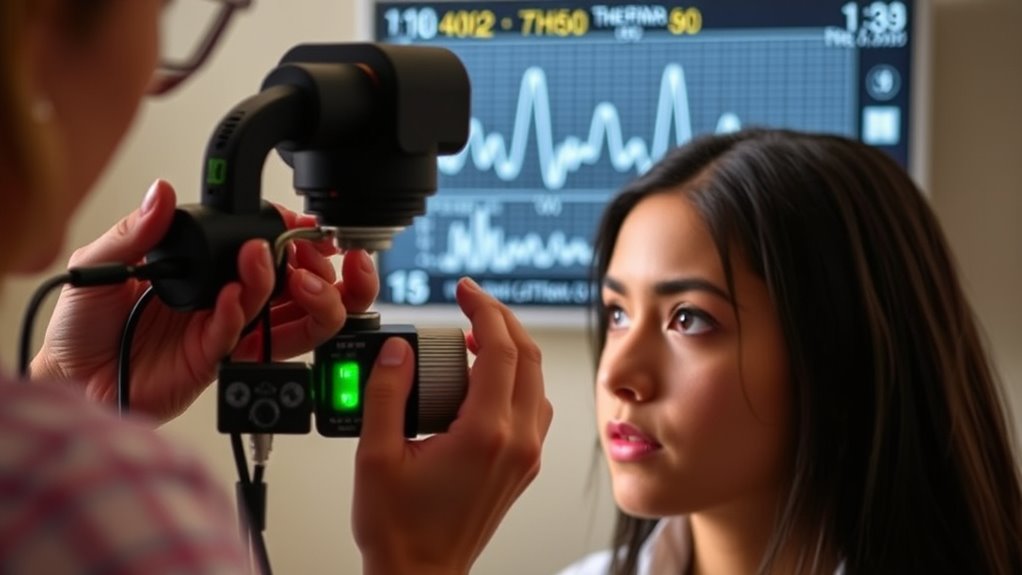Auditory processing disorder (APD) happens when your brain has trouble interpreting sounds, even though your ears hear normally. Hearing loss, on the other hand, involves damage to ear structures that reduce sound input. While APD makes understanding speech difficult, hearing loss affects how much sound you can hear at all. Recognizing these differences can help you find the right support—continue exploring to learn more about managing each condition effectively.
Key Takeaways
- APD involves normal ear function but impaired brain processing of sounds; hearing loss results from ear damage reducing sound input.
- APD causes difficulty understanding speech and processing sounds, especially in noisy environments; hearing loss typically reduces sound detection.
- Diagnostic methods differ: APD uses auditory processing tests; hearing loss is diagnosed with pure-tone audiometry.
- APD can be managed with auditory training and therapy; hearing loss may require hearing aids or other amplification devices.
- Both conditions may share risk factors like genetic predisposition or environmental factors, but their underlying causes and treatments differ.
Defining Auditory Processing Disorder and Hearing Loss

While auditory processing disorder (APD) and hearing loss both affect how you perceive sound, they are fundamentally different conditions. APD is a neurodevelopmental challenge that disrupts how your brain interprets sounds, even if your ears are functioning normally. It involves issues within the auditory pathway, making it difficult to distinguish speech or sounds in noisy environments. Hearing loss, on the other hand, typically results from damage or dysfunction in the ear structures, which reduces the amount of sound reaching your brain. With APD, your ears pick up sounds correctly, but your brain struggles to process them properly. Understanding this distinction helps clarify why some people can hear but not understand, while others simply cannot hear certain sounds at all.
Causes and Risk Factors for Each Condition

The causes and risk factors for auditory processing disorder (APD) and hearing loss differ markedly, reflecting their distinct origins. Genetic factors often play a significant role in both conditions, with inherited traits increasing the likelihood of either disorder. For hearing loss, genetic mutations can affect ear development or function, leading to congenital or early-onset loss. Environmental influences are especially relevant for both; exposure to loud noises, infections, or ototoxic medications can damage the ears or auditory pathways, increasing risk. Additionally, childhood illnesses, head injuries, and certain prenatal factors can contribute to either condition. While genetics provide a baseline risk, environmental influences often determine whether and when these conditions develop, underscoring the importance of protective measures and early intervention. Widespread cases of infidelity highlight how environmental and psychological factors can significantly impact well-being and relationships.
Common Symptoms and Signs to Recognize

You may notice that understanding speech, especially in noisy environments, becomes challenging. Listening difficulties might be a key sign that something is going on. Additionally, if you or your loved one often confuses similar-sounding words, it could indicate an underlying issue. Being aware of protective styling benefits can also help in managing hair health while addressing auditory processing concerns.
Recognizing Listening Difficulties
Listening difficulties can manifest in various ways that often go unnoticed, making it essential to recognize the signs early. You might find it hard to focus on conversations, especially in noisy environments, indicating challenges with auditory attention. If you frequently feel exhausted after listening, it could be due to listening fatigue, which strains your mental resources. You may also struggle to follow multi-step instructions or miss key details during conversations. These signs suggest your brain is working harder to process sounds, even if your hearing appears normal. Recognizing these symptoms early helps in seeking appropriate evaluation and support. Pay attention to how often you feel drained after listening or if your focus drifts during conversations—these are key indicators of listening difficulties.
Noticing Speech Confusion
Speech confusion often becomes noticeable when sounds or words blend together, making it difficult to understand conversations clearly. You might find yourself struggling with speech clarity, even in familiar settings. Words may seem jumbled or muffled, leading to frustration or misunderstandings. This confusion can affect your ability to follow conversations, especially in noisy environments. You may also notice that your language comprehension feels delayed or incomplete, causing you to ask for repeats frequently. Recognizing these signs is important because they suggest your brain isn’t processing speech effectively, which could be a sign of auditory processing disorder rather than hearing loss. Additionally, patterns of behavior such as inconsistent responses or difficulty following multi-step instructions can also indicate processing challenges. By paying attention to these difficulties, you can seek proper evaluation and support to improve your communication skills and overall understanding.
Diagnostic Procedures and How They Differ

Diagnosing auditory processing disorder (APD) and hearing loss involves distinct procedures that highlight their different underlying issues. You’ll undergo specific tests that focus on auditory processing or hearing sensitivity. Here are the key diagnostic distinctions:
- Auditory testing for APD assesses how your brain interprets sounds, often involving complex listening tasks.
- Pure-tone audiometry measures hearing sensitivity, helping identify hearing loss.
- Speech-in-noise tests evaluate how well you understand speech amid background noise, highlighting processing difficulties.
- Middle ear assessments check for issues like fluid or damage that cause hearing loss.
These procedures help professionals differentiate between the two conditions, ensuring accurate diagnosis and appropriate intervention.
Treatment Approaches and Management Strategies

Effective management of auditory processing disorder (APD) and hearing loss requires tailored treatment strategies that address their unique challenges. Therapy techniques, such as auditory training exercises, help improve your brain’s ability to interpret sounds and enhance listening skills. For APD, you might work with a speech-language pathologist who develops customized activities to strengthen auditory processing. Hearing loss can benefit from sound therapy or communication strategies to optimize hearing efficiency. Assistive devices play a vital role; hearing aids amplify sounds for those with hearing loss, while listening devices or FM systems can help individuals with APD better process speech in noisy environments. Combining therapy techniques with the appropriate assistive devices allows you to better manage both conditions and improve your overall communication. Additionally, understanding auditory processing capabilities can guide personalized treatment plans to address specific auditory challenges effectively.
Impact on Learning and Daily Communication

Have you ever noticed how difficulty in processing sounds can affect your learning and daily interactions? If so, auditory discrimination and auditory memory might be the culprits. These issues can markedly impact your ability to understand speech and follow instructions. Here are four ways it can affect you:
- Struggling to distinguish similar sounds, leading to misunderstandings.
- Forgetting spoken information quickly, hindering learning.
- Difficulty following multi-step directions in class or conversations.
- Misinterpreting speech in noisy environments, causing frustration.
- Challenges in adapting to new technological tools or educational platforms, which increasingly rely on automation and digital interfaces.
These challenges make communication and learning harder, especially in busy or noisy settings. Recognizing how auditory processing issues influence daily life helps you seek appropriate support and develop strategies to improve communication skills and educational success.
Frequently Asked Questions
Can Auditory Processing Issues Improve Over Time Without Intervention?
You might wonder if auditory processing issues can improve naturally over time. While neuroplasticity potential offers some hope, natural recovery prospects are limited without intervention. Your brain can adapt to certain sounds or stimuli, but persistent processing difficulties often require targeted therapy to see meaningful progress. Without intervention, improvements are unlikely to be significant or long-lasting, so seeking professional help can greatly enhance your chances of better auditory understanding.
Are Hearing Aids Effective for Auditory Processing Disorder?
Did you know that about 25% of adults with hearing difficulties use hearing aids? While hearing aids are highly effective for hearing loss, their effectiveness for auditory processing disorder is limited. You’ll benefit most from auditory training, which improves how your brain processes sounds. Hearing aid effectiveness varies, so consult a specialist. They can recommend strategies tailored to your needs, ensuring you get the best support for your condition.
How Early Can Signs of Auditory Processing Disorder Be Detected?
You can often spot signs of auditory processing disorder through early detection, sometimes as young as preschool age. Developmental signs include difficulty understanding speech, especially in noisy environments, poor listening skills, and delayed language development. If you notice these signs in a child, it’s important to seek professional evaluation promptly. Early detection allows for targeted interventions, which can markedly improve communication skills and overall development.
Is Auditory Processing Disorder Hereditary or Acquired?
You might wonder if auditory processing disorder is hereditary or acquired. It can be caused by genetic factors, meaning it runs in families, or by environmental influences, like head injuries or infections. While some cases are inherited, others develop from life experiences or health issues. Understanding these factors helps you better recognize the disorder and seek appropriate treatment for yourself or a loved one.
What Technologies Assist With Daily Communication for These Conditions?
Imagine clearer conversations, better understanding, and less frustration. Assistive listening devices like hearing aids and FM systems help you hear better in noisy environments, while speech therapy enhances your communication skills. These technologies work together to support your daily interactions, making conversations smoother and more natural. By using assistive listening and speech therapy, you take control of your hearing health and improve your quality of life every day.
Conclusion
Understanding the differences between auditory processing disorder and hearing loss helps you seek the right support. Don’t assume they’re the same—each needs specific treatment. By recognizing the signs early, you can improve communication and quality of life. Even if it feels overwhelming, remember that with proper diagnosis and strategies, you or your loved one can thrive. Taking action now makes a real difference in overcoming challenges and enhancing everyday interactions.










